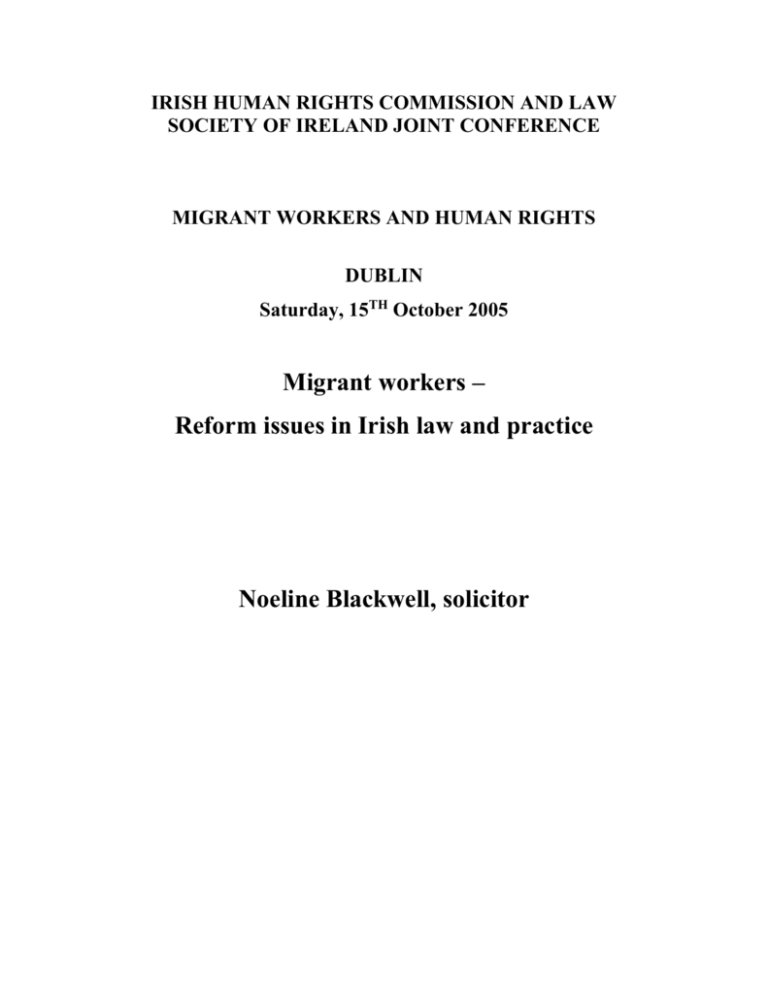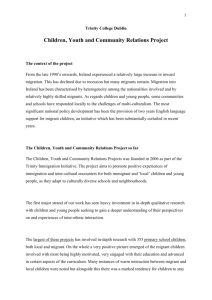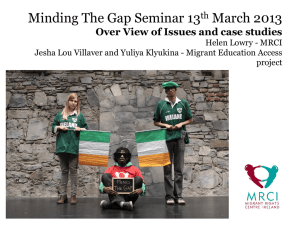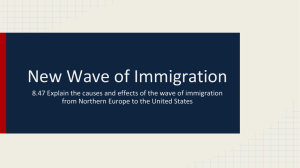Publication in doc format - Irish Human Rights & Equality Commission
advertisement

IRISH HUMAN RIGHTS COMMISSION AND LAW SOCIETY OF IRELAND JOINT CONFERENCE MIGRANT WORKERS AND HUMAN RIGHTS DUBLIN Saturday, 15TH October 2005 Migrant workers – Reform issues in Irish law and practice Noeline Blackwell, solicitor As this section of the day concerns issues of reform in law and practice relating to labour migrants, I propose to reflect on some loosely connected issues where migrant workers may be disadvantaged and where reform might make a significant impact on the realisation of their rights. International Convention on the Protection of the Rights of all Immigrant Workers Ideally, the reform of the law in relation to migrant rights would happen by a comprehensive and connected series of adjustments to Irish law and practice so that, in conformity with Irish constitutional standards and best international human rights standards, our laws, policies, regulations and procedures would promote and protect the rights of migrant workers. If the State wished to proceed on that basis, then an appropriate standard is readily available in the United Nations International Convention on the Protection of the Rights of all Migrant Workers and Members of their Families (the Convention on Migrant Workers). Like other international human rights agreements, this Convention sets standards which create a model for the laws, and for the judicial and administrative procedures of individual states. Although it was adopted in 1990, the treaty has only been ratified by 27 countries world wide. None of the states of the European Union or of industrialised North America have ratified it. In its Discussion Document on Immigration and Residence in Ireland, issued in April 2005, the Department of Justice, Equality & Law Reform states at p.64: “It would appear that in order for Ireland to ratify the convention, significant changes would have to be made across a wide range of existing legislation, including legislation addressing employment, social welfare provision, education, taxation and electoral law. These changes would also have implications for our relations with our EU partners, none of whom has signed or ratified the convention, and possibly for the operation of the common travel area between Ireland and the UK. There are no plans at present to introduce the changes in the areas above which would be necessary before Ireland could ratify or consider signing the convention.” This statement, which echoes Ireland’s official position to the UN, is a telling statement that reforms are needed in our law in order to protect migrant workers rights. While it is disappointing to see that changes would be needed across so many parts of our legislative and policy code order to comply with human rights standards, it is helpful to note in the same Discussion document, in relation to the Convention on Migrant Workers and other International Labour Organisation (ILO) Conventions which remain without ratification, the Department states that: “While Ireland (like most EU Member States) has not ratified these Conventions, which are therefore not binding on Ireland, their contents should be taken into consideration in the development of policy in this area.” Even though the Convention on Migrant Workers has not been ratified, migrants, as individuals are entitled to protections and respect in the State in a variety of ways, in Irish statute and constitutional law, European Union law, and several other international human rights treaties that Ireland has ratified. Migrants are entitled to the same rules and protections as Irish people, but, as was pointed out in the submission made in July 2005 by the Law Society’s Human Rights Committee on the Department’s discussion document: “[I]n certain respects they may be more vulnerable and need extra protections and services (for example, special enforcement of employment law to avoid exploitation, and social services with language assistance and special training for cultural differences). In accordance with general principles of human rights law, discrimination is only permitted for a legitimate state purpose and must be proportionate to the objective to be achieved”. The migrant worker from outside the European Union I will now turn to some specific issues. A small number of non-EU nationals do not need specific permission to be employed in Ireland. These include the citizens of countries closely associated with the EU in the European Economic Area and Switzerland, together with some people who have permission to reside in the State on refugee or humanitarian grounds, and the spouses or parents of EU citizens. Everyone else needs an individual permission. That permission to be employed can issue as a work permit, or a work visa or authorisation. If the Employment Permits Bill 2005 which is currently before the Oireachtas is passed, the terminology will change, but the concepts will remain the same. In terms of the protection and integration of migrant workers, there are concerns about both forms of permission, but the concerns around work permits are more widespread. At present, highly skilled, well-paid people who propose to work in various sectors where Ireland has identified a labour shortage may apply for a work visa or authorisation. These sectors are currently identified as information technology, professionals in the health care sector, and professionals in the construction sector. If an authorisation/visa is granted, they may work for any person within that sector for up to two years following the issue of the visa. They may change jobs. They may alter the terms and conditions of their employment. The employer may employ a person with a work visa without an extensive search to identify if there is any other suitable candidate in the job market. The spouse of a person on a work visa will be allowed to join the employee quite quickly and, though needing a work permit will be allowed to get that permit with less proof than the employee. By contrast, an intending employee who wants to work outside of those favoured sectors must get a work permit. The person must get a specific job offer in advance. The intending employer must apply for the work permit. Excluding certain academic, research and medical posts, the permit will only be granted if the Department of Enterprise Trade and Employment is fully satisfied that the employer could not find someone within the EU labour market to carry out the job even if the employer would be happier with the third country national. The process, including advertising the job vacancy, will currently take about 10 weeks and there is no permission to work in the job pending the decision. The work permit belongs to the employer (although the draft legislation proposes to change this). The terms and conditions are fixed. If the job does not work out, the worker has to find another employer willing to go back to the Department and apply for a further permit. A permit lasts for a maximum of a year. There are restrictions on having other family members join the permit holder. Both forms of permission have been criticised because they fail to provide certainty. This has practical consequences, particularly in the high skills areas where employees may be courted by other countries which are willing to provide more long term prospects of residency and better conditions for the worker and his or her family. However, even with that criticism, the working visa or authorisation has many advantages over its sister document, the work permit. Apart from the shorter period of time for which it is issued, the application for a work permit is cumbersome and time consuming. That, together with the narrow scope of the permission, can lead and has led to exploitation of workers. It is good to note that the Employment Permits Bill 2005 proposes that in future, the work permit should actually issue to the employee, rather than the employer. However the employer continues to apply for it and employees can be fearful of any complaint to an employer or of an employer because if the employment is terminated, the employee will have no job at all. This absolute commitment to one employer allows for no flexibility and makes it extremely difficult for a worker to leave an abusive or exploitative employment. Given that any such exploitation is unhealthy for society in general, offends against standards of equality and non-discrimination in law, and on some occasions constitutes an offence at law, it needs to be tackled at various levels. Firstly, a current arrangement whereby a person who is made redundant may seek employment under much less onerous conditions should be extended to cover migrant workers who have been forced to leave their employment. However more is needed. Adequate enforcement of existing legislation on standards of employment, including a strengthening of the labour inspectorate, is essential. So also are measures to ensure that migrant workers are adequately informed of their rights, through public information campaigns, education through the community and access of migrant workers to trade unions and to legal aid and lawyers. Permission to set up a business In addition to permissions for workers who are employed, application can also be made to the Department of Justice Equality and Law Reform for permission to engage in business in the State, and to reside here for that purpose. Subject to some exceptions the main proofs required are a business plan which shows that the business will employ at least 2 Irish nationals and will add to the viability of the economics of the State. In addition, the applicant has to show a capital in excess of €300,000 for the business. These applications do not have a dedicated system and it is not clear if the business plans, which have to be prepared by accountants, are examined by experts. The requirements of such a substantial capital in this age has to be questioned. Many worthy ideas require much intellectual capital, but not money. The Department suggests that in its review of residence, another scheme may be introduced for people with less capital, but innovative ideas. Even this will not cover a number of cases which were refused not on their merits, but for failing to meet the capital criteria for such people: those working in the horse industry and those working in alternative medicine. The criteria should relate to the genuine nature of the project and to the need for the service in the community rather than to a criterion which, of itself, does not guarantee a viable business idea. The worker as a family member My colleague Aisling Ryan is addressing the issue of family reunification. This continues to be a difficult and frustrating area for migrant workers in Ireland. While EU migrant workers have the right, and those on favoured work visas usually have permission to bring their spouses to Ireland during their employment, the fact that people on work permits may have to wait until their permit is renewed for a second year before they can apply to have their spouses join them can be seriously disruptive of family life. Further, the spouse of a work permit holder, except in special cases, has no right whatsoever to work and will have to follow the same procedure to get a work permit before he or she can work. This places substantial obstacles in the way of the enjoyment of family life and privacy and must be rethought. The definition of “family” is also in need of review. Traditionally, the Irish immigration service has described the family of an adult as the legally married spouse and children under 18. This does not take account of the rights of unmarried couples and same sex couples to family life, or of adult members of the family who are often, in different societies, an integral part of a family. In this regard, I note that the Department of Justice, Equality & Law Reform Discussion Paper looks at the issue from an Irish constitutional viewpoint and from the perspective of an EU directive. It does not dwell for very long on the extensive jurisprudence of the European Court of Human Rights on the topic (except to note a decision in Gul v. Switzerland where reunification within Switzerland was refused). While it is true that the Court stated that the family could exercise its right to family life and privacy in the applicant’s country of origin, the court has also had much to say on what constitutes a family. That jurisprudence clearly points to a broader definition of family than will be found either in our constitution where the family is defined as that based on marriage, or the restrictive interpretation given to the concept of family in EU family reunification directives. Independent appeal system The question of whether or not a family member will be permitted to join a migrant worker is very often one of fact. This leads then to a brief look at how decisions are taken within the immigration system. As the Discussion Document puts it at p.125: “The requirements of transparency and fair procedures indicate that there should be a process whereby persons aggrieved by adverse immigration decisions should have the opportunity to have those decisions looked at afresh.” Many decisions of great import to a person’s life and livelihood are made within the Irish immigration system. The refusal of a visa or a Deportation Order may affect a person’s ability to travel anywhere within the European Union or even more widely. A decision in relation to work may deprive a family of a needed income. A permission to remain in the State on humanitarian grounds may save a person’s life. Decisions within the system do not have to be made promptly or can be made with undue haste. It is not clear what expertise is employed to scrutinise an application for business permission or legal submissions on residency or employment. Currently, there are few or no mechanisms for appeal within the general immigration system. The system for seeking asylum has its own procedures which are not relevant here. The Employment Permits Bill 2005 provides for a limited review mechanism under which the decision of the Minister to refuse to grant an employment permit may be submitted to the Minister for review. The problem with this kind of internal review is that it lacks the transparency that it is acknowledged is necessary. Further, it is unlikely that justice can be seen to be done in a case where the Minister is the final arbiter at all stages. In many similar purely administrative procedures within the public service, there is a failsafe mechanism against poor or irrational decision-making. That is the Ombudsman’s office. However, in the area of immigration, the Ombudsman’s powers and the powers of the Ombudsman for Children appear to be limited. The legislation setting up both appears to exclude decisions relating to immigration. However, Ombudsman Emily O’Reilly, in a talk at Flac’s conference on Public Interest Law & Litigation on 6 October 2005, spoke of an instance where her office conducted an investigation into the refusal of a visa. She said that the current position was unclear and confusing and should be clarified. A useful reform of the system would be to permit the Ombudsman to scrutinize the decisions and administration relating to immigration matters. Irregular immigrants I also want to touch on the difficulties faced by those who are irregular migrants in the State. The issue is particularly topical at the moment. On 6 October last, Dáil Eireann unanimously passed a motion to support US Senators Kennedy & McCain in their latest attempt to legalise the position of undocumented migrants in the United States, including a large number of Irish. This is not the first effort to legitimise those whose status in the USA is irregular. If passed, it will give an immigrant visa to those who had been working without permission in the country, allowing them to live and work in the States, and to travel to and from the country. For those who are under 25 or in school, there is no requirement to show prior employment. In the course of the Dáil Debate, the Minister for Foreign Affairs, Mr. Dermot Ahern TD, quoted in the Irish Times of 7 October 2005, rightly pointed out that: “Its provisions, if enacted, would enable undocumented people, including the undocumented Irish, to participate fully in the life of their adopted home free from fear and uncertainty." Each society that has migrants has irregular migration. National law, and the Convention on Migrant Rights all recognise the right of the State to determine who enters its territory and to suppress and discourage non-regular migration. This however, does not take from the obligation of a State to respect the rights of migrants. Insofar as human rights are universal, applicable to everyone, a State may only interfere with a migrant’s basic human rights in a manner that is proportionate to its aims and so even those who are irregularly in the State are entitled to basic rights. Irregular migration can happen because people come in without proper authorisation, or, if they have papers permitting them to enter, they overstay the length of the permission or breach the terms of the permission. Some are trafficked for the purpose of sexual exploitation or exploitation of their labour. However, in the country where they are hidden people, they are normally beyond the law. Any interaction that they do have is likely to be with the criminal law. The proposals in the Department of Justice, Equality & Law Reform discussion document are understandably aimed at deterring such immigration. However, a suggestion that State services might be restricted only to emergency services for those without papers is worrying. All the major European studies show that most irregular migrants are working. Because they work in secret, they are already more vulnerable to abuse of their working conditions. Many of them are women. Many of them work in isolation, including in domestic settings. For many, as for many Irish in the USA, the full extent of their illegality is in their irregular entry into and work in the state. Proposals to restrict their access to services, except on an emergency basis, seem to be disproportionately severe and disproportionate to the end to be achieved. At a practical level, implementation of such a measure would mean that part of society would not have access to basic health and education services for themselves or their children. This seems not only to be contrary to their basic human rights but dangerous for the society that permits that situation. To deny them access to labour regulation mechanisms would also be inconsistent with their right of access to justice. In short, the category of irregular migrant is not a homogenous one, and should not be treated as such. This does not deny the real dilemma of the State in fighting those who traffic in human beings. Trafficking takes place where people are moved from one country to the other and where the trafficker makes a profit, not from the movement, but rather from exploiting the labour or the sexual activity of the victim of the trafficking. Even here, care must be taken to ensure that the rights of the victim are respected while continuing the fight against the criminal trafficker. As the EU raises more barriers to access, trafficking becomes an increasingly difficult and dangerous business, and the victims are more at risk. Currently, it is extremely difficult for such people – normally women – to come forward because of the risks. If they seek to break away from the exploitation, they risk being prosecuted for an illegal activity and worse, they risk deportation back to the country from which they were first trafficked, where they may very well face danger again from the criminals who originally started the exploitation. There is a real need to ensure that the State’s protection programme for refugees and others in need of protection recognises that deportation in such circumstances may risk persecution, torture or death. Standards for change Ireland’s immigration law has come a long way in the last ten years. It was inevitable that it would grow incrementally, based on our actual experience. That manner of growth led to the management and development of immigration law through an administrative system. That part of the system which related to asylum seekers and refugees was placed on a statutory footing some years ago. Much of our enforcement code has also been on a statutory basis for some time. Now it is the turn of part of the employment code. The rest will no doubt follow in due course. In the course of that transition, the State has the opportunity to test its proposals and systems against fair standards. Those must be, I submit, the standards of natural and constitutional justice, and of international human rights law.







